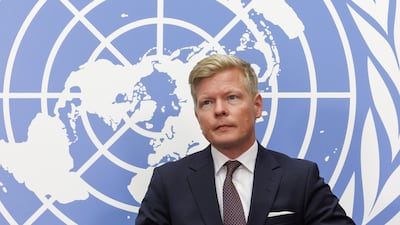Progress towards a political solution to Yemen's civil war is being held back by the continued exchange of threats between the government and Houthi rebels, the UN special envoy has told the UN Security Council.
Despite a lull of more than a year in the fighting between Iran-backed rebels and the internationally recognised government, the UN has struggled to bring both sides to the negotiating table.
The UN special envoy for Yemen, Hans Grundberg, said in a briefing to the Security Council late on Wednesday that "public threats to return to war", as well as economic warfare between the government and rebels, were undermining peace efforts.
Mr Grundberg said intermittent fighting has continued, but hostilities between the Houthis and the government had not returned to levels seen before a six-month UN-brokered truce that ended in October.
He singled out six frontline areas, including Taiz, Yemen’s third-largest city which has been under siege by the Houthis since 2016, Hodeidah, where Yemen’s main port is located; and the oil-rich eastern province of Marib, which the Houthis attempted to seize in 2021.
Mr Grundberg said discussions with both sides showed “general willingness to seek solutions, but this still needs to translate into concrete steps, in particular, a clear agreement on the way forward that includes restarting an inclusive Yemeni political process”.
The threats to return to war are “not conducive to maintaining a fruitful mediation environment”, he said.
He called on both sides “to refrain from escalatory rhetoric” and continue to use channels established under the truce to de-escalate incidents.
Yemen's conflict began when the Houthis seized the capital, Sanaa, in 2014. A Saudi-led coalition intervened the following year at the invitation of the government.
Mr Grundberg said the Houthis and the government were continuing to use "antagonistic economic measures to weaken the other side”, a problem he had flagged to the council in a briefing last month.
“The government is still being prevented from exporting petroleum products, its major source of revenue, and intra-Yemeni trade in goods and services remains curtailed due to restrictions and the imposition of exorbitant fees and taxes,” he said.
The Houthis are taking away the population's "dignity" as the funds that come from exports will be used towards the rebuilding of the country, a government official told The National.
Yemen's deputy minister of youth Hamza Al Kamaly said: "The money that we get from the petroleum exports goes towards payments for civil servants' salaries, such as [those in the] the health and education sector. These criminals don't want Yemeni people to live in dignity.
"The Houthis want to make money from taxes and fees and that has major consequences on the population, such as starvation and the spreading of disease."
He said the government had so far lost $1.5 billion because of the Houthis.
The British ambassador to the UN, Barbara Woodward, urged the Houthis to stop "attacks and continued threats to prevent oil exports from government-controlled areas", which she said were having a severe impact on Yemen's economy.
US Ambassador Linda Thomas-Greenfield said Washington strongly condemned the "senseless" rebel attacks on maritime shipping (which) are also exacerbating the humanitarian crisis".
"Only a durable and inclusive political resolution between the parties can ease the suffering of the Yemeni people," she said.
She welcomed Saudi Arabia's recent announcement of $1.2 billion in budget support for the government.
"But more attention and financial support are needed to address Yemen's economic and humanitarian crisis," she said.


